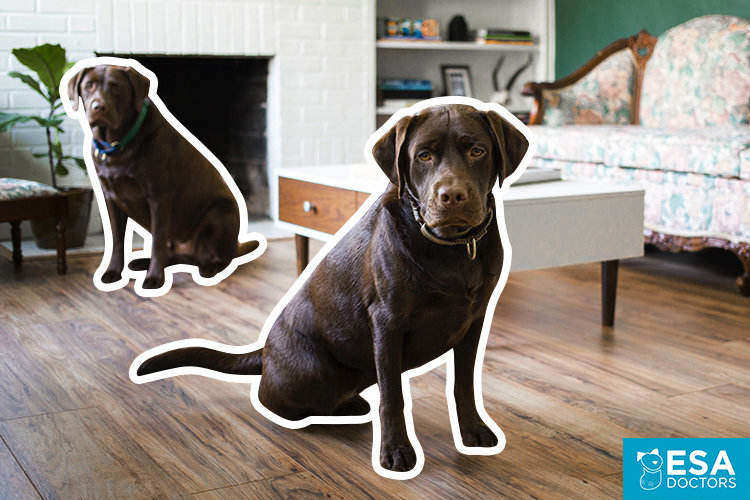- Co-op buildings are buildings where tenants are shareholders of the building. Co-ops are run by the Co-op Board the owners and tenants must follow building rules.
- New York State prohibits apartments, condos, and co-ops from denying an applicant due to age, sex, religion, race, disability, etc.
- Emotional support animals and their owners are protected by the Fair Housing Act (this always overrules Co-op rules).
- You must have an ESA letter in order to live in a no-pets building with your Emotional Support Animal.
- If you are turned away from an apartment, condo, or co-op for having an ESA, you can fight for your rights.
Co-ops, or cooperatives, are apartment buildings owned by a corporation, where residents buy shares to a particular apartment. These shares entitle the purchaser to a long-term proprietary lease for the space. These cooperative buildings have their own Co-op Board of Directors, who follow internal laws set forth by federal regulations. Because owners can be both shareholders and tenants, issues faced can be complicated to handle because of how the Board of Directors can mainly be a third party in dispute matters. However, because they are required to follow federal regulations, a tenant or shareholder with a disability can reference federal rules in cases of discrimination.
What Do New York State housing laws state about discrimination?
According to the NYS Fair Housing Guide, discriminating against a person with a disability because of their need to use an emotional support animal in order to enjoy their apartment complex is prohibited by law. This law is the New York State Human Rights Law, which prohibits housing discrimination based on race, creed, national origin, sex, age, marital status, military status, family status, sexual orientation, gender identity, and disability. Because of the NYS Human Rights Law, these laws apply to all types of housing, including, but not limited to, public housing, condominiums, cooperatives, and rental apartments.

Emotional support animal owners have rights that allow their animals to live with them, even if Co-op rules do not allow pets in the building.
Do these rights apply to my Emotional Support Animal?
While discrimination laws apply to those who are disabled, in cases of service animals, disabled people cannot be denied services and accommodations for housing. However, depending on the law followed, some extra steps may be needed for that disabled person to have their animal in the apartment complex. The definition of service animals, in reference to the Fair Housing Act, is broader than the ADA’s definition of service animals. Because the ADA only applies to service dogs and miniature horses, animals such as emotional support animals qualify under the Fair Housing Act and thus have extra procedures to follow.
In cases of a disabled person having an emotional support animal, the person who’s applying for the apartment must be able to show documentation that he or she has a disability, thus qualifying them for the tenancy, and be able to show that the emotional support animal is required to enjoy the apartment. This requires that medical or psychological expert testimony or evidence must be provided to indicate that the animal is necessary in order to use and enjoy the condo.
What kind of documents do I have to provide to the Co-op Board for my ESA?
Necessary evidence or testimony can come in the form of an ESA letter written and signed by a licensed mental health professional. Co-op Boards must accept documentation from licensed mental health professionals and allow the future or existing tenant to live with their emotional support animal, even if the Co-op does not normally accept pets into the building. A legitimate ESA letter will be written on the licensed mental health professional’s official letterhead and include their licensing information and signature. The Co-op Board can verify that the ESA letter was indeed written by the LMHP by requesting additional documentation or by contacting the LMHP.
A Co-op Board cannot request emotional support animal registration papers or certificates if an ESA letter is provided. The Fair Housing Act does not require your ESA to be registered to any database.
How can I tell if I have been discriminated against by the co-op?
Because it can be hard to tell upfront if someone is discriminating against you, one of the ways that the New York State determines if these rights have been violated is by conducting tests through an agency. Agencies that are approved and funded by the federal government can help investigate complaints by testing the agency or landlord for those violations.
If the agency has been able to prove that discrimination has taken place, federal laws direct that steps may be considered to remedy the situation. This can include imposing fines and penalties, requiring changes to policies, assessing monetary damages, and or making housing available for the tenant.
How do I settle discrimination disputes when applying for a co-op apartment?

Co-op buildings can be difficult and confusing but know that ALL Co-ops must allow disabled people with emotional support animals to buy or rent in the building.
Because so many different laws protect the housing rights of people with disabilities, an individual who believes his or her rights have been violated must look at the various rules and determine which rules apply in each situation and what protections can be provided.
Sometimes, when working with a cooperative apartment agreement, disputes may arise concerning what services can be provided and labeling what rights the disabled person has in a situation.
For example, in one case, the cooperative attempted to argue that the plaintiff, or applying application for the apartment, lied by not disclosing their disability when the plaintiff required a washing machine in his apartment to wash his soiled clothes as the result of his treatment for rectal cancer. While the plaintiff did not mention this during his board interview, their policy stated that washers and dryers are prohibited within the units. The New York state court, however, cited that it is not permitted to inquire about the applicant’s disability, which resulted in the plaintiff winning the case.
How to fight for your rights when applying to a Co-op with an ESA.

If you are being denied from a Co-op building due to your ESA, you can fight back! Know your rights and have the right documentation in hand so you can’t be denied.
If you are having trouble with your Co-op board in regards to your emotional support animal, you can email the Co-op Board with your ESA letter and ask if they are denying reasonable accommodations. If they respond with invasive medical questions, understand that you are not required to provide your private medical information to anyone. If they are not providing additional information and blatantly discriminating against you and your emotional support animal, you can contact HUD and file a complaint.
Qualify for an ESA Letter Today
Get the Love and Support you deserve!







What rights do tenants in a coop building have if they don’t want emotional support animals in a no pet building. Some residents just get the doctor to write a note and wham bam! In comes the dog. A lot of these people do not follow the rules set down and I am told that I have no rights under the ADA Act. Is this true?
Emotional support animals have rights under state and federal Fair Housing laws, not the ADA. Coops can’t reject an ESA just because other tenants don’t like animals. The ESA is however expected to be well behaved. It can’t create a health or safety hazard, and it can’t destroy property.
We’ve just had people move into the building with an ESA and the dog barks, periodically. It’s a big dog with a big bark. Very upset to learn that we have no rights in a building that we specifically picked because of the no-dog policy. We came from a residential neighborhood previously that had scores of barking dogs that the owners did not look after, etc. So now these new people have moved in and when their doorbell rings or the dogs – they have two – hear activity in the hallway they bark like mad. This is very disturbing for everyone else above, below, and in the vicinity of their apartment. We don’t want to impose or make a problem for them if they feel the need to have ESAs, but no one notified us from management about this and we are just hoping that once they get settled this isn’t going to be a problem. I really don’t want to have to sell and move the way the current housing market is.
Sorry to hear about your situation. We suggest discussing this with your building management. While ESA owners are protected under Fair Housing rules, they also cannot create a nuisance for their neighbors. Your landlord should work with tenants to ensure that everyone can enjoy their home in peace.
I am in New York State.
I’ve had an ESA for 4 years. No complaints. He is well behaved & we ensure he never causes a mess.
Some residents in my building are under the impression that owners w/ESA animals are not allowed to leave their ESA in the unit w/a dog sitter when they need to travel and the ESA cannot come (not all travel allows for the ESA to come along ie work travel, visiting hospitals, or leaving the country etc).
Neighbors insinuated that ESAs do not have rights to be there without the owner. That their extended rights only exist when the ‘owner’ is present.
This seems untenable, since we cannot take ESA animals everywhere, including work. And boarding the dog causes stress and health concerns for the dog upon return. When left with a sitter, he is well behaved and well cared for.
I own in a co-op building (which is a unique ownership structure to New York).
These points were not being directed at me specifically, and are not related to behavior issues or noise.
It’s simply about who is allowed to be in the building. We CAN have babysitters etc for our children.
Any guidance appreciated, or links you can send me to to look.
Thank you!
ESA owners are allowed to leave their animals at home, and also use third parties to care for their emotional support animals. HUD references this in their latest rules. Please see this article for more info: https://esadoctors.com/hud-housing-rules-emotional-support-animals/
My husband was suggested to get an ESA from his doctor. We are currently renting in a coop. I emailed the landlord and she has no problem with it but says that I would have get the boards approval. I’ve emailed the board and they said they would let me know after the next board meeting but won’t give a date. Could I get a dog in the meantime?
Under HUD guidelines housing providers should respond within 10 days of receiving an ESA accommodation request.